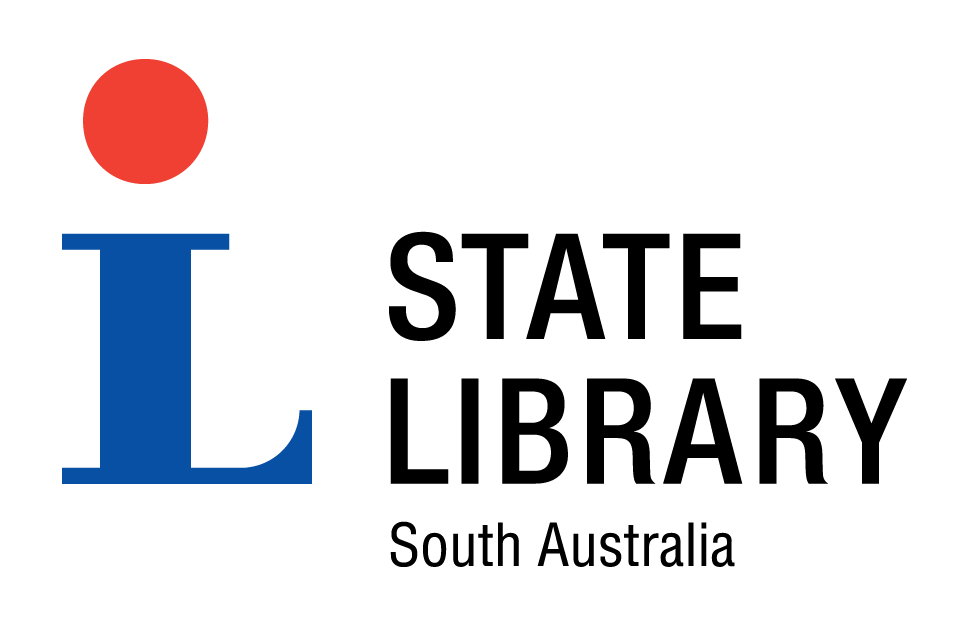
South Australian childhood
The words from Francis Thompson's Essay on Shelley are carved on the front edges on the shelves of a book case that for many years stood in the old Children's Library of the State Library of South Australia:
'Know ye what it is to be a child?
It is to believe in love; to believe in
Loveliness, to believe in belief.
It is to be so little that elves can
Reach to whisper in your ear.'
While these words are not specific to South Australian children but were, and should be, for children everywhere, they are quoted here because of that unique bookcase and its place in the story of South Australian children.
South Australian children are little different from children elsewhere in Australia, other than in the way some state legislation affects them and differs from that in other states of the Australian Commonwealth, for example school leaving age.
The term 'child'...is subject to so many variables; its meaning has changed from one period of history to another, from one social class to another, from one sphere of activity to another. Legally different age limits have been set for childhood in regard to the age of consent, the age of marriage, the right to leave school, the right to drink in a hotel, the duty of military service, the right to vote and the right to drive. These definitions of childhood vary from state to state in Australia...(Fabian, Children in Australia, p. 6)
Until the latter half of the 19th century children were seen as 'miniature adults'. Then laws were introduced, first in England and quickly afterwards in Australia and elsewhere, which addressed the specific needs of children in the realms of education and law. For some time after these reforms, however, social class was still the distinguishing feature in the lives of children until these distinctions narrowed throughout society as a whole.
Recollections of childhood
The State Library's collections hold the reminiscences of some South Australians' childhoods. They come from a diversity of people and from a number of periods in South Australian history. Most speak about aspects of their schooling, or of the need to leave school early to help support the family, of games they played, of making do in hard times. A few quotes may give some idea of this.
Sir Joseph Cooke Verco rose from relatively humble origins to gain his medical qualifications in London, then returned to private practice in Adelaide and later became Dean of the Faculty of Medicine at the University of Adelaide. In his recollections published in 1963 in South Australiana he recalls the 'museum' (pp. 67-9) he and his brother maintained in an outhouse at their home. In this 'they stored their collection. Everything which took their fancy as curious or which seemed in any way Scientific was gathered and arranged in place.' Mineral samples were obtained through their father who attended 'the meetings of his mining companies and brought home pieces of ore ... malachite and mundic and galena, and native copper and peacock ore and green carbonate of copper and iron ore etc. These were all laid out on pieces of card and labelled as exactly as the Young Curator of the Museum could determine.' The quarry behind Government House was also a source for fossils, and Botanic Park provided a variety of specimens.
Verco writes also of their games of marbles and tops, of counting out rhymes and of fishing and swimming in the River Torrens:
Another bathing place was still further up the river, and rejoiced in the dreadfully repulsive name of "Death Hole", because not a few persons had been drowned in it. It lay just below a sharp bend of the river to the west of the Company's Bridge [near the present Hackney Bridge] The jumping off place was on the south eastern side of the stream and here the water was very deep. The proper thing for the expert bather to do was to dive into the river from this point and work his way to the bottom, grab a handful of gravel from below, and rising to the surface throw it in the air as proof he had fathomed the depth. (p.73)
Dorothy Gilbert was one of the Gilbert Family of Pewsey Vale, pastoralists, vine growers and vignerons. Gilbert's wines won medals at the intercolonial exhibitions. The family's life was one of privilege among Adelaide's elite. Her recollections of her childhood are recorded in a letter to her nephew and were published in 1973 in South Australiana.
Gilbert writes of vice-regal visitors:
The first Governor I actually remember was Sir Fowell Buxton about 1896 or 97. Lady Victoria was an invalid & not able to travel. So this was the Party: Sir Fowell Buxton, Miss Victoria, man-servant & personal maid driving in the vice-regal carriage Miss Mabel & the aide-de-camp Major Guyse, on horseback...We children had all practised our curtsies & bows for days...Next morning we trooped into prayers, we all did our best, especially the three "little ones", then to our horror of us older ones John marched up to the Governor & said "you have got my chair". We were filled with confusion, but the Governor didn't seem to mind, he gathered all three in his arms & sat them on his knees. ...Then Sir George Le Hunte [Governor 1903-09] spent the Christmas of 1906 with us. Lady Le Hunte was in England spending the Christmas holidays with their only daughter who was at school there, & the Governor wanted a family Christmas, so it was arranged he should come to us...he was a delightful informal guest, riding & walking with us, & amusing himself with our books & English papers. (p. 67)
By contrast Elizabeth, Thomas and Robert were the children of John and Margaret Cameron who arrived in Adelaide in October 1855. John was a printer with the Register. Their recollections are recorded in Reminiscences of the Cameron family.
Elizabeth (born 1855), recalls:
There were no Public Schools, so we went to a private school in Norwood, run by three sisters named Bennet, and then we went to what we used to call Kranmers School, but I was not there very long, as I was only twelve, when my father died and I had to go to work...I started working at a cake shop in Rundle Street, and worked from 8 in the morning until 9 at night, for six days a week, and was paid 3/- [shillings] a week.
Bob remembers:
...I left school when I was 13, and went to work at the Advertiser office where my father worked before me, and I followed his profession. When I started, I worked from 7.30 in the morning until 6 at night and on Saturdays from 7.30 until 4, and I was payed [sic] 2/6 a week.
Tom, however, recalls the lighter side of life:
...we used to make up our own theatre. We had figures on sticks, and three of us operated those from the sides of a homemade stage. The whole thing was about as big as a table, while another lad behind the curtains read the dialogue. It was good fun and we used to charge our friends a penny to see it, and then of course we used to have our own concerts and I think there was more home life in those days.
Mrs Speck (OH 24/34) was born in the early 1900s. She recalls:
My mother was widowed when I was 8, so we had to be very careful with our spending. Sometimes mother had to say 'no' to us because we couldn't afford things. I can't remember being unhappy about this because we had so many compensations amongst our friends and in our home. ...well I remember I never had a bought article till I was 16, and that was my very first overcoat.
All children seemed to have chores to do. Dorothy Gilbert recalls:
After lunch we had another hour's school then a walk with our governess or two of us rode, very quiet ponies & we exercised the rabbit dogs & were given little jobs, like reporting holes in fences, levels of waterholes and troughs which made us feel important & useful to Father. (p.69-70)
For other children the tasks were more onerous and an important part of the farm work.
Reginald Chuck (OH 38) was born in 1920 and lived in Kalangadoo:
Well, when we got a bit bigger, we had to take the cows to the paddock. Everybody milked a couple of cows. We had to get the cows from the paddock, and take them back after they were milked, ...I often used to ride a pony up there and take them up, and we used to go back after school and fetch them and bring them home again. But for a time that was Eric's job, that was my brother's job. When I was a little bloke I had to get the fire wood, and then as he got bigger and he went off to high school I inherited the cow job and my brother, Stan, he inherited the firewood job.... When I left Kalangadoo school I was really only eleven. I hadn't quite got to twelve. So then I went to Penola High School for twelve months. Then I left I was still only twelve then. I still hadn't reached thirteen actually, when I left school...the first job I did when I left school, was droving sheep on the road.
Many things have changed since the late 19th century and even the early 20th century with each generation since then experiencing some new development: radio, television, computers and the rush of technological development in the 21st century. School is more formalised and the school leaving age has been lifted to 16 years (17 in 2009). Many children have part-time jobs after school or at weekends, to provide more spending money and perhaps still to aid family finances. Families still expect children to perform chores around the house and for many are rewarded with pocket money for this.
Despite legal and social changes to the concept of childhood, alterations to the nature of school and chores, the transformation of community amenities for children and many technological advances in toys and games, children still advance to adulthood acquiring skills and knowledge through their childhood experiences of play and learning.
Further Reading:
Cameron Family. Reminiscences of the Cameron family, ca. 1946
Chuck, Reginald. Interview with Reginald Lindsay Chuck, Kalangadoo Primary School's 'Voices of the Past' Entry, 1988
Cliff, Paul (ed.) The endless playground: celebrating Australian childhood with introductory essays by Robert Holden and features by Jack Bedson ... [et al.] Canberra: National Library of Australia, 2000
'A colonial boy-hood: some recollections of Sir Joseph Cooke Verco, 1858-1867', South Australiana, volume 2, number 2, September 1963 pp. 61-100
'Country life in the later nineteenth century: reminiscences by Dorothy Gilbert', South Australiana, volume 12 number 2 September 1973 pp. 57-70
Dow, Gwyn and June Factor (eds.) Australian childhood: an anthology, South Yarra, Vic.: McPhee Gribble, 1991
Fabian, Sue. Children in Australia: an outline history, Melbourne: Hyland House, 1980
Richards, Eric (ed.) The Flinders history of South Australia. Social history, Netley, S. Aust.: Wakefield Press, 1986 Chapter 14 Growing up
Speck, Mrs. Interview with Mrs. Speck, Port History Project, 1977
Internet links:
Victoria and Albert Museum: Museum of Childhood. Children's lives: Edwardian lives
Items 1 - 12 of 59














